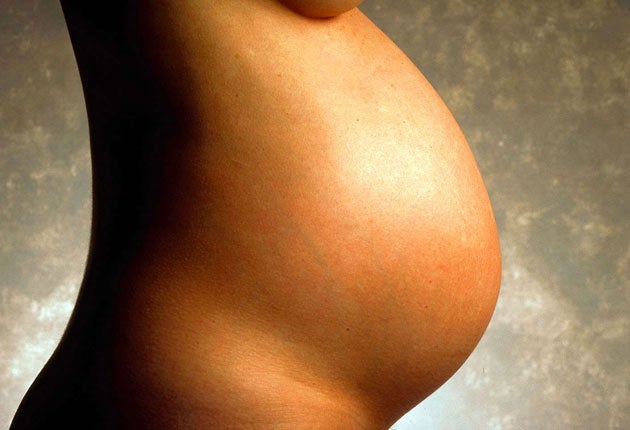Why health at conception must be immaculate
Women trying for a baby told to watch their diet

Your support helps us to tell the story
From reproductive rights to climate change to Big Tech, The Independent is on the ground when the story is developing. Whether it's investigating the financials of Elon Musk's pro-Trump PAC or producing our latest documentary, 'The A Word', which shines a light on the American women fighting for reproductive rights, we know how important it is to parse out the facts from the messaging.
At such a critical moment in US history, we need reporters on the ground. Your donation allows us to keep sending journalists to speak to both sides of the story.
The Independent is trusted by Americans across the entire political spectrum. And unlike many other quality news outlets, we choose not to lock Americans out of our reporting and analysis with paywalls. We believe quality journalism should be available to everyone, paid for by those who can afford it.
Your support makes all the difference.The lives of future generations are being threatened because women trying for a baby are neglecting their health at the crucial moment of conception, doctors warn today. The environment in which a foetus is conceived can be critical to the later physical and mental development of the child, affecting its IQ, risk of obesity and of a range of diseases throughout life.
Advice about nutrition and lifestyle is widely followed in pregnancy, but few women pay attention to the recommendations when they are attempting to get pregnant.
A study of more than 12,000 women aged 20 to 34 who were followed for four years found those who became pregnant were only marginally more likely to have followed recommendations on smoking, alcohol consumption and folic acid intake than their non-pregnant peers. More than three-quarters of the 238 women who became pregnant had planned their pregnancy to some degree but there was little difference between their lifestyle and that of the women who had not planned to conceive.
Professor Hazel Inskip, an epidemiologist at the Medical Research Council Centre in the University of Southampton and lead author of the study published in the British Medical Journal, said: "The foetus is particularly vulnerable in the first few weeks. Early influences affect the risk of miscarriage, may contribute to the obesity epidemic, have an impact on IQ and all sorts of subtle long-term effects.
"How we protect the next generation is very important. Parents want the best for their children but people get more twitchy once their children are alive. Society needs to be thinking about this earlier."
The National Institute for Clinical Excellence (Nice) recommends that women trying to become pregnant should avoid tobacco and alcohol, take daily folic acid supplements to prevent birth defects, eat a healthy diet and take exercise, the scientists said, but few do so. The results showed that fewer than 3 per cent of the women who became pregnant complied fully with the guidance on alcohol and folic acid. But when they knew they were pregnant, they followed the advice more closely.
Professor Inskip said: "The difficulty is that few women know when they are going to get pregnant. If your lifestyle is to go out drinking with friends you might not want to tell them. No one wants to say they are trying for a baby because it is so difficult if they fail."
Public health specialists at the University of Southern Denmark said: "Pregnancy has been called a window of opportunity for health promotion because it is thought to be the time when women are most willing to give up unhealthy habits ... Sadly, the window often opens too late."
Making a good start: The guidelines
* Follow a healthy, balanced diet with plenty of fruit and veg, starchy foods, and dairy. Avoid processed food and keep to two cups of coffee a day.
* Cut out alcohol, smoking and drugs, which can affect the chances of conception and harm the foetus.
* Wait three months after coming off the Pill before trying to conceive, to reduce miscarriage risk.
* Take a multivitamin with 400 micrograms of folic acid every day for a month before trying to conceive.
* Make sure multivitamin supplements include zinc (30mg per day), selenium (100mg per day), iron and vitamins A, B, C and E.
* Consider a general health check, especially if there is a family history of medical conditions such as diabetes, cystic fibrosis or epilepsy.
* Take regular, moderate exercise.
* Check vaccinations are up to date
Join our commenting forum
Join thought-provoking conversations, follow other Independent readers and see their replies
Comments